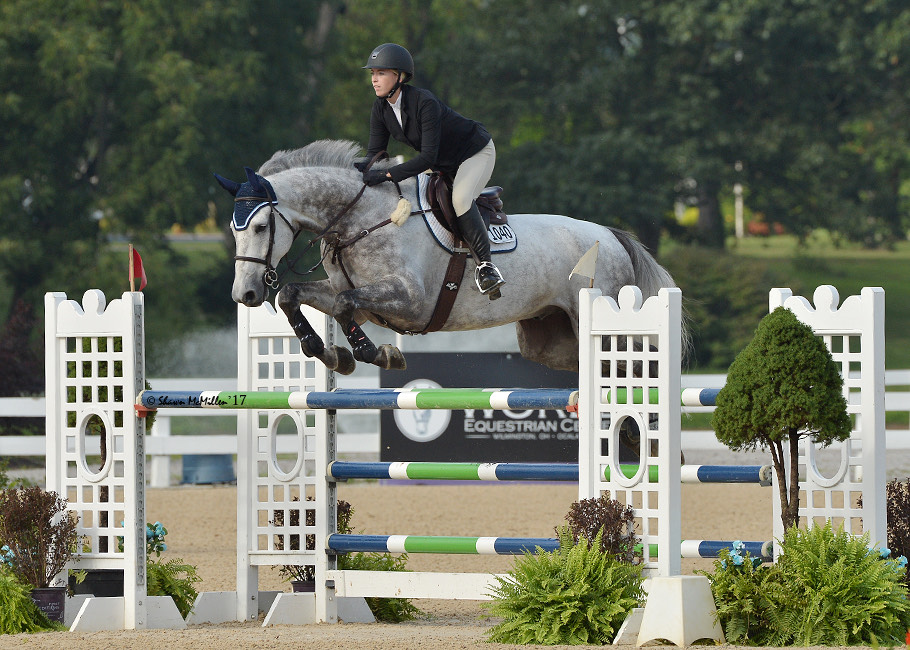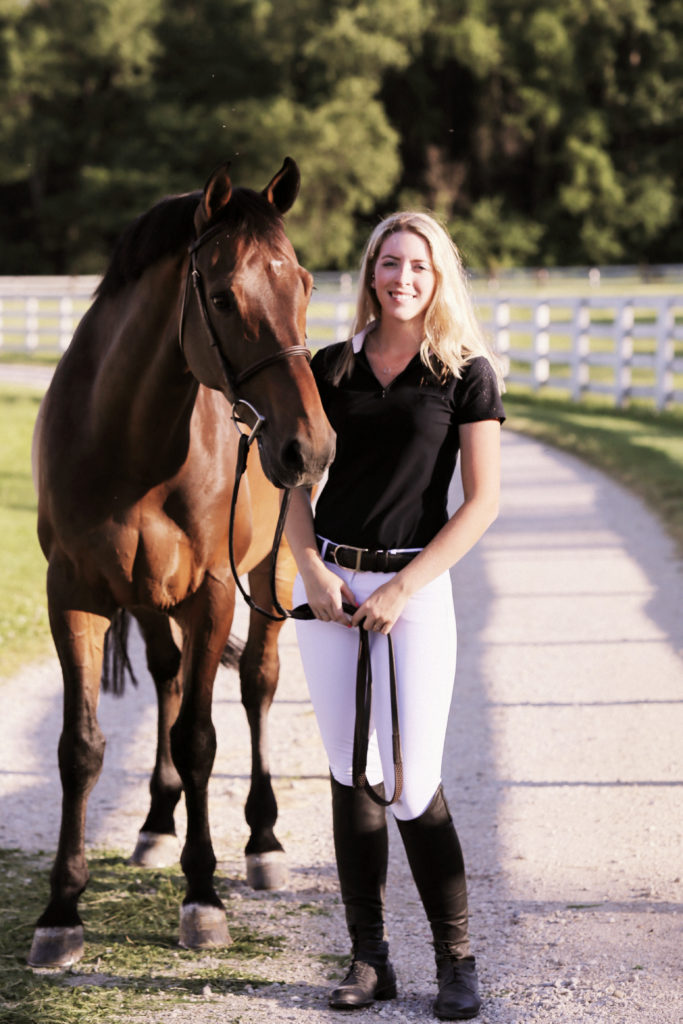As hunter/jumper sport grows, new generations of recreational riders, competitive riders, and professionals are emerging. I personally find it fascinating to see how equestrians who have been in the business for decades are now passing on their own experience to others who are hungry for knowledge and are now rising in the sport themselves.
Rising young professional Becca Lannoye of Rebecca Lynn Performance Horses based in Batavia, Illinois is one such equestrian who is wise beyond her years. Even despite the hard-hitting COVID-19 pandemic, she has still found ways for her business to succeed. I sat down with Becca to learn more about her growing business and her own riding philosophies.
 Becca Lannoye on Fürst. Photo by Shawn McMillan.
Becca Lannoye on Fürst. Photo by Shawn McMillan.
Lynn Mueller: When did you first get the idea to strike off on your own, as well as dedicate your career to the horse industry?
Becca Lannoye: It has always been my end goal since I was little! I never steered in a different path; it was straight forward, horses all the time. As a kid, I didn’t show a lot. I did have a horse, but it was just one horse. This proves that not all professionals out there were trainers’ kids with multiple horses! I showed more at the end of my junior years, then it was full speed ahead. I enjoyed working with different types of horses and working with other people. I truly enjoyed seeing clients improve with instruction.
LM: How did you first start networking to gain clients or rides on other horses?
BL: Much of the networking was through friends. I had a lot of friends growing up that knew they needed a rider, so we started relationships that way. The riding then grew into someone else who needed someone to help with lessons, which grew into others spreading the word. Word of mouth goes far.
LM: Who had the biggest impact on starting your riding career and your business?
BL: Definitely Thomas Cerra. I was with him for several years in Wayne, IL until he moved locations to a new barn. Thomas got my riding career going. He helped me find nice horses and brought out the best in both my riding and horses. I still show with Thomas and train with him. He was instrumental in helping me realize this is what I want to do – he was as invested in my riding as I was and pushed me to improve (call it “tough love”). He also helped me find my Jr/Am jumper Corvette, as well as my current horse, Fürst.
LM: What do you enjoy the most about being independent, versus working for someone else?
BL: I love that at the end of the day, I’m in charge of every single horse individually and am responsible for all of the decisions. It helps me know more about each horse. At the end of the day, in this type of work, I’m the one there from sunrise to sunset, and especially with accountability, if something doesn’t go as planned, I’m responsible – I need to fix it and learn from it. I also like being my own boss!
LM: What is the hardest part about being independent, versus working for someone else?
BL: I want everyone and every horse to do so well, and I’m so invested in every horse and rider individually, it can take a toll personally. My brain is constantly going, thinking about what else I can do to help. For example, if someone has a particularly difficult lesson, I’ll stay up late thinking about how else I can help that horse and rider pair. It can be difficult to break away and give myself time to relax, taking a step back and still getting the desired outcome without getting so wrapped up in things. Time management can also be a challenge, as far as making sure that everyone is well prepared for a horse show but still fresh.
LM: What do you enjoy more, teaching or riding a client’s horse?
BL: Riding a client’s horse, though I love both! I enjoy the time spent connecting with the horse under saddle and being able to get the best out of the horse that I can, which inevitably helps the rider. I also like being able to demonstrate what’s happening with the horse, and then being able to show that to the rider. I also like working on individual horses and their weaknesses, as well as figuring out how their brains work.
LM: Do you have a particular favorite show?
BL: I have two – WEF and the Kentucky Horse Park. They are two very different show venues. Kentucky is such a horse friendly environment, and the horses love going out on the cross country field. Wellington is a totally different, very prestigious atmosphere. There are so many nice horses and amazing riders, that the competitiveness is totally different – to be able to go in and win out of 100 horses in a class is an amazing feeling.
LM: What is your favorite type of horse to work with?
BL: Personally, I like the horses that are a little hotter, the ones that take you to the fence more. However, I try to get the best out of any horse that I have. For example, even if a customer’s horse is on the lazier side, he may be a great fit for that client. Every horse is different – it’s important to match a horse with the individual client, not necessarily what I personally would love to ride myself. You also won’t necessarily have the same horse every day. They have bad moods, good days. It’s important to ride the horse you have that day.
LM: What is your favorite type of client to work with?
BL: Anyone with a work ethic who wants to get better. Several of my students are so invested in the horses, not just the riding. They want to learn more about nutrition, veterinary work. My favorite type of client is someone who is passionate, someone I can pass knowledge on to; someone who wants to be around in the barn and wants to learn. They don’t necessarily have to be the most “talented” rider in the world. It’s all about work ethic and keeping an open mind.
LM: Do you have any advice for others who are thinking about starting their own business?
BL: If you want it, do it. Jump right in and make it happen. Remember, at the end of the day, it’s about the horse – no matter how the ride went, what ribbon you won. At the end of the day, it’s about what you can learn from the horse or your ride. Keep your learning hat on. Also, just because you turn professional and are starting to teach other people, the best you can do is always keep learning. In addition, if you stop learning, you may be surpassed!
LM: Has COVID-19 impacted your business? Has it impacted your ability to ride your own horse?
BL: It has definitely impacted the show schedule, with no horse shows! I also had plans to attend WEF for two weeks, but WEF ended up early, so that definitely threw things for a loop. As far as my own barn goes, it is quiet and very clean. Riders can space out times that they can go to the barn to ride. We’re just being more cautious, especially with hand washing. We’re still training but giving the horses a bit more relaxation time. The ones that can have time off are having time off now. Hopefully, in the summer, the shows will be up and running again.
LM: What are your short term goals for Rebecca Lynn Performance Horses?
BL: In the short term, I want to keep gaining quality clients and keep a family atmosphere where we cheer each other on. I also would like to add a few more great horses to the program. I also hope that we can get back to attending horse shows again!
LM: What are your long term goals for Rebecca Lynn Performance Horses?
BL: In the long term, I want my clients to continue growing and achieving whatever division they want to be in. I’d also love to have a few more quality sale horses in the barn, as well as continue to gain good clients and good horses. In addition, I would like to compete in the Grand Prix with my current horse, Fürst. It’s important to keep myself growing, as well as the clients. Clients and horses are the main part of the business. If they are growing, they stay with you, and it means you’re doing your job. It means everyone is happy, and they’re enjoying their riding. Happy everything!
To learn more about Rebecca Lynn Performance Horses, follow Becca on Instagram.
Go Jumping!
Editor’s Note: Some responses have been edited for clarity.

